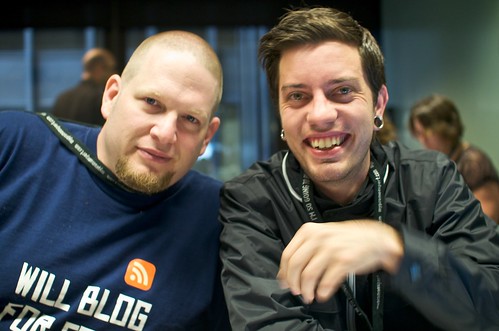
Chris Brogan and Julien Smith, co-authors of “Trust Agents,” at SOBcon in May. (Photo by JD Lasica)

 It’s always cool to see one of your friends hit the best-seller list, and that’s what just happened to Chris Brogan, the Tiger Woods of inbound marketing. Chris (@chrisbrogan on Twitter) and Julien Smith (@julien on Twitter) have their first book out: Trust Agents, and it’s receiving quite a bit of praise from the social media cognoscenti.
It’s always cool to see one of your friends hit the best-seller list, and that’s what just happened to Chris Brogan, the Tiger Woods of inbound marketing. Chris (@chrisbrogan on Twitter) and Julien Smith (@julien on Twitter) have their first book out: Trust Agents, and it’s receiving quite a bit of praise from the social media cognoscenti.
Here are five questions I put to Chris this week about Trust Agents and social influence marketing:
1Welcome to the pantheon of published authors. Is it what you expected? How did you marshal your social media assets and contacts to help push “Trust Agents” up the best-seller lists?
Chris Brogan: It is and it’s not. I was surprised that publicity mechanisms don’t seem as attuned to the social media world’s new methods. Things seem to be the way they were years ago. I mean, our people at Wiley are wonderful, and I don’t know anyone doing it better, but I still think there’s more opportunity to do some new and creative things with book marketing. How did WE do the bestseller thing (twice, I might add: NYT and Wall Street Journal)? We asked our friends. I’m just lucky that I have ten thousand friends.
2With so many other books about social media out there, what specific gap in the marketplace did you want to fill with your book? What do you hope it adds to the conversation?
Chris Brogan: We didn’t write about social media. That was our magic trick. We wrote about how to be a human at a distance. Social media isn’t cool. It’s a set of tools. Connecting to humans is cool. That’s what we wrote about. We wrote about how to be human, and that’s timeless, baby.
3What’s the biggest surprise you came across in researching Trust Agents?
Chris Brogan:The biggest surprises are everywhere. We changed the entire structure of the book midway through, and turned it into a book about six big ideas with lots of how-to information and stories to back it up. That was markedly different from what we showed Wiley when they said yes. What else did we learn? That we’d uncovered ways to talk about building business relationships that had nothing to do with Twitter/Facebook/LinkedIn, but instead, had everything to do with understanding how people use those tools in the new world.
4The word “brand” has a commercial slant to it, but we all build our brands or online identities in the digital age. In the book you and Julien write: “choose an official online name and stick with it.” What advice do you have for individuals who have a presence across multiple social networks?
Chris Brogan: We’ve all created our own dialtones. We’ve created our own TV shows, our own radios, everything. There is no “Jerry’s List” any more. With that in mind, make it easy for people to do business with you. That’s why we tell people to keep a unified presence. Why make it harder for people to connect?
5Can you riff a bit on the notion of Trust Agents, or Agent Zero, and the value that such people can bring to an organization?
Chris Brogan: A trust agent is the person that we know, that hangs out in the places we hang out. She’s a smart user of media tools to say what she wants to say. She connects everyone around her, and grows relationships across many industries, geographies, and strata. She uses her abilities to be helpful, and she builds armies of people who can all participate in the growth of her pursuits. Organizations can benefit from these natural connectors, from the power of bringing in resources from everywhere to bear on challenges, and from the awareness that comes from sharing our attention around groups of interested parties.
Sounds a bit hippie when I write it, and yet there are examples all around us. Red Hat built a billion dollar business selling free software. Zappos sold their business for just shy of a billion dollars because they believed customer service was the most important aspect of a company. What am I to believe? That they did it wrong?
Related
• 5 questions for the author of ‘Twitterville’
• 7 questions for the author of ‘Say Everything’
JD Lasica, founder of Inside Social Media, is also a fiction author and the co-founder of the cruise discovery engine Cruiseable. See his About page, contact JD or follow him on Twitter.
I'm reading this book right now. What has struck me is the very essential part about being a good human being (and not a sales weasel.) Just good basic etiquette, play nicely with the other kids, and they'll be nice back.
Receiving a person's trust shouldn't be taken lightly. It's an honor and something you can't do for a finite amount of time–for this project, or that one…it has to be all the time, you have to live up to it.
Debbie Hemley
http://www.impressionsthroughmedia.com